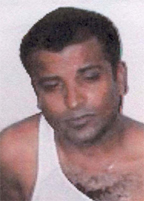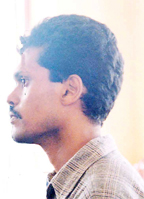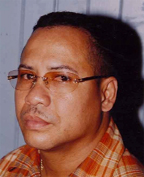Despite acknowledgement by the authorities that drug lords and gangs operate in Guyana, there has never been a single local arrest and prosecution of a major figure in drug trafficking here, though there have been three guilty pleas to this crime in the US and six convictions in Barbados recently.

Now politicians from the two main opposition parties are calling on the Government of Guyana and the police to seek information from their foreign counterparts and launch local investigations in an effort to tackle the spiralling drug problem.
Police Crime Chief Seelall Persaud has said that the force need the evidence before they can launch an investigation into the activities of convicted drug kingpin Roger Khan, and Cabinet Secretary Dr Roger Luncheon said the authorities need “definitive information to the effect that criminal activities and specific criminal activities have taken place”. However, CANU had said in February this year that it was looking into the importation of several Tundras and Titans believed to have been purchased with proceeds of the drug trade and shipped here. Former minister of home affairs Gail Teixeira had also famously exhorted Guyanese not to patronize drug lords’ establishments indicating at least tacit acknowledgement of the enterprise here.
And last week, Deborah Backer of the PNCR and Raphael Trotman of the Alliance For Change, both parliamentarians, expressed the view that the government should not only launch an investigation into the activities of Khan but also those of Raphael Douglas and Peter Morgan, who have both admitted in US courts that they had conspired to traffic in cocaine.
The Barbadian authorities could also be contacted for information following last week’s conviction of six Guyanese in that island for trafficking in large amounts of marijuana and cocaine.

Backer said none of the persons who pleaded guilty or were convicted would have operated in a vacuum as they would have been a part of local drug enterprises. “The government should be concerned about the drug enterprise and needs to collect information from wherever …to get to the bottom of the drug trafficking,” Backer told Stabroek News in a recent interview.
Trotman does not only want an investigation into drug trafficking but as he has repeatedly said, the authorities need to investigate the alleged links Khan had with the Government of Guyana while he was here.
This call by Trotman and others has been staunchly opposed by President Bharrat Jagdeo who has stressed that he does not give any weight to the words of Khan who has said several things in the past.

Earlier this year Khan had pleaded guilty to trafficking in some 150 kilogrammes of cocaine among other charges, while on Monday last Morgan admitted that he conspired to traffic in more than five kilos of cocaine.
Last year Raphael Douglas was convicted of distribution of cocaine and was returned to Guyana on June 11, 2008. Douglas, a former basketball official here before being arrested in Trinidad had entered into a plea deal with the US government. As a result the US dropped four other drug-related charges against him and taking into consideration a previous imprisonment in Canada and the time he spent behind bars since his apprehension in 2005, he was released.
Only last week Monday a Barbadian court convicted six Guyanese of trafficking in narcotics and they are expected to be sentenced next Monday.
Lemme Michael Campbell, 45, and his wife Somwattie Persaud, 40, both of 106 New Garden Street, Georgetown; Christopher Bacchus, 43, and his wife Dianne Bacchus, 37, both of Bay Gardens, Bayland, St Michael, Barbados; Wayne Gavin Green, 38, of North Ruimveldt, Georgetown and Bridgefield, St Thomas, and Rohan Shastri Rambarran, a 43-year-old businessman of Georgetown, Guyana, were all convicted of being in possession and trafficking in 91.3 kilos of cannabis and 119.4 kilos of cocaine on November 30, 2005. Campbell and Rambarran were also convicted of importing both cannabis and cocaine on November 29, 2005. The six had pleaded not guilty to the charges.
Holistic
According to Backer, who is the shadow Minister of Home Affairs, there is need for the authorities to view drug trafficking in a holistic way, since not because Guyanese have been convicted in other jurisdictions it meant it had nothing to do with Guyana.
“…We cannot take the view that they have been convicted in the United States or as in the recent case they have been convicted in Barbados that it has nothing to do with us. Because I think that the drug… is in transit in Guyana and it means that our security is compromised,” Backer said.
She stressed that it would be “narrow minded or not far looking” if that is the attitude of the local authorities since they would not “be looking into the future and looking at it in a holistic way.” The convictions overseas, she said, “shows that we are not doing what we are supposed to do because if we are not cocaine-producing then we should be looking to stem it at the point of entry and also because what we have are two things, you know we have it coming in, entering Guyana, and then we have it exiting in some form or perhaps concealed differently.”
Backer posited that there is sufficient evidence, adding that the governments approached other governments for aid in several areas and so there is nothing to stop Guyana doing the same to get information on drug trafficking. She pointed out that the country would not be compromising its sovereignty in any way if friendly countries are approached for information.
“Because what you want to do, your ultimate goal is to reduce if not completely eradicate the movement in and out of Guyana and of course those staying here. So any lead that you have that could help you… to get more information to plug these gaps, if you are serious about drug fighting it doesn’t matter where the information comes from you should want it so that you can improve the conditions of the country,” Backer said.
And she said when those convicts are deported they should be people of interest to the local authorities and more should be done to ascertain who are their local partners.
‘Nail in coffin’
Meanwhile, Trotman at a recent press conference said it is important for local investigations to be launched as there is “too much out there about Guyana.”
Zeroing in on Khan, Trotman noted that while President Jagdeo is on record saying that Commissioner of Police Henry Greene should launch an investigation as it relates to Khan, so far no such investigation has commenced.
The President at a press conference had said that local authorities were obligated to investigate Khan’s activities in Guyana, including his alleged involvement in executions and extensive drug trafficking.
But he had emphasized that US collaboration was essential and placed the burden for seeking available evidence squarely on the shoulders of Greene, saying that it was his job. “If there was any criminal offence that was committed in Guyana, then we have an obligation, once we get the information to pursue that.
“I said this before: We have an obligation, according to our laws, if people were killed here and we have information that this was so, it requires collaboration with the US government.”
Trotman noted that Khan has repeatedly said he did certain things on behalf of the Guyana government “and every day that this government refuses to call an independent enquiry or to create one, I believe it is driving a further nail into its own coffin.”
However, if President Jagdeo is to have his way there would be no investigations into the alleged government links, because when he was asked about Khan’s claims that he had worked closely with the government and law enforcement officials on crime fighting, Jagdeo said that Khan has said several things but he had not placed any weight on his utterances.
“I have said before, Khan said several things, he said that [former Commissioner of Police Winston] Felix was undermining the Government of Guyana too, he said he had taped conversations with people sharing information who are linked to drug dealers,” the head of state had said.
“I have never put any store on what Roger Khan has said in the past or not said. I never decided whether he is guilty or not guilty, so if he pleads guilty he has to face the consequences, that is clear,” he had said.
The AFC leader is of the view that the claims of Khan and the regular drug convictions are causing tremendous embarrassment to the people of Guyana.
“Hence we find our citizens in Barbados, Antigua and Trinidad being scoffed at, discriminated against, being thrown out because people feel you have a cowboy government and we are not about to take you in and give you refuge…” Trotman said.
“We believe that there is enough on record, there is enough being given as evidence in other jurisdictions, particularly in the United States to warrant an independent investigation both between the Office of the Director of Public Prosecutions and the Office of the Commissioner of Police… there is enough,” Trotman said.
And Trotman is of the view that no official documentation would be handed over by the US government to the local authorities because there is a “credibility issue.”
However, he maintained that there is enough to warrant the police force commencing its own investigation and if that fails then the DPP should request of the force to commence an investigation “because the thing is becoming uglier and I daresay in a few days we would have more names being revealed. Undoubtedly, there has to be an investigation into everything that is occurring…” he said.
Meanwhile, Crime Chief Persaud, following Khan’s guilty plea, had said that the force can only launch an investigation into Khan’s activities if it was presented with information and evidence but he did acknowledge that Khan was one of the drug players who the police believed was very big and who operated in Guyana “but he was only one of them.”
When asked if the force would launch an investigation should Khan return to Guyana after he had served his sentence, Persaud had said he did not know what the future held, adding that if the US presented Guyana with information on Khan’s activities then “we would do an investigation. Or if anyone comes forward and tells us ‘well listen, I know this happen’… yes we would do an investigation.”
When he was further pressed on whether the police would take the initiative and launch an investigation based on Khan’s guilty plea Persaud had stated: “What can you take? Describe this initiative for me please? We work on information, if there is no information what can we work with?”
Persaud also had said he was only interested in information and transcripts that are presented to the force by United States officials and once they explained that crimes occurred in Guyana there would certainly be an investigation.
The US government had said that Khan was the leader of a Georgetown-based cocaine trafficking organisation, which was backed by a “paramilitary squad that would murder, threaten, and intimidate” others at his directive. The organisation imported large quantities of cocaine into Guyana, which were then shipped to the Eastern District of New York and other places for distribution. The US government had said Khan’s enforcers committed violent acts and murders on Khan’s orders that were directly in furtherance of his drug trafficking conspiracy.
The paramilitary squad was referred to as the ‘Phantom Squad,’ which a confidential US source said was responsible for “at least 200 extra-judicial killings” in Guyana between 2002 and 2006.
Prior to fleeing to Suriname after there was an attempt to arrest him, Khan himself placed newspaper advertisements in the Guyana Chronicle and the Kaieteur News stating that he had been involved in crime fighting in Guyana and had worked closely with local and US law enforcement officials.
The now dead George Bacchus, a self-confessed informant for the ‘Phantom Squad’, which targeted suspected criminals for execution, claimed that its formation was in response to the upsurge in violence. The then home affairs minister Ronald Gajraj was linked to the group by Bacchus, but was subsequently cleared of any involvement by a Presidential Commission of Inquiry.




